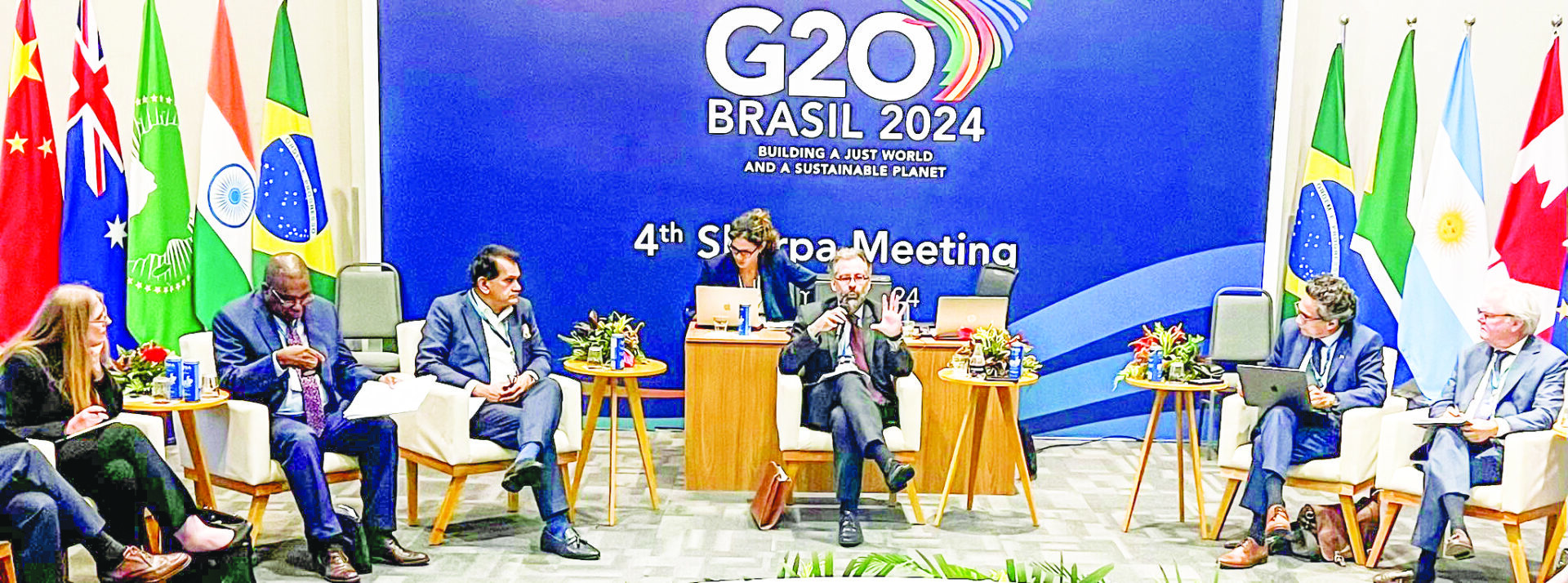India is expecting the Rio Declaration to contain a strong collective appeal for urgent democratisation of global governance institutions and expansion of the UN Security Council to accommodate emerging economies.
NEW DELHI: As world leaders descend this week on Rio de Janeiro, a new anthem of renewal of the global multilateral system, led by the Global South, will resonate amid notes of carnival and samba which the picturesque seaside city is famous for. At the Museum of Modern Art, the venue of the G20 summit, Prime Minister Narendra Modi will join the leaders of the world’s major economies to brainstorm on 18-19 November on a wide swathe of cross-cutting issues to shape an inclusive world order, free from poverty, hunger, and socio-economic disparities.
FOCUS ON GLOBAL SOUTH
The G20 summit this year is special as this is the first time the 55-nation African Union (AU) will participate as a full member after being inducted in the G20 family at the New Delhi summit last year. The Global South will be the reigning flavour at the summit as Brazil has invited, besides G20 countries, the leaders of 18 invitee countries, which include five from Africa.
Building on the signature outcomes of India’s G20 presidency, the Rio summit is poised to be transformational and a unique moment crystallizing the rise of the Global South in the international arena. This will be the third consecutive year in which a major country from the Global South will be hosting the G20 summit after Indonesia (2022) and India (2023). At the end of the Rio summit, the baton will pass to South Africa, a stalwart of the Global South and the powerhouse of the African continent.
For Brazil’s President Lula, the G20 summit will be an opportunity to reassert his credentials as a champion of the global underdog, which is reflected in the credo of the Rio summit: “Building a Just World and a Sustainable Planet.” In sync with Lula’s politics of social emancipation, Brazil has identified three core priorities of its G20 presidency: I) The fight against hunger, poverty and inequality; II) The three dimensions of sustainable development (economic, social and environmental); III) The reform of global Governance. Prime Minister Modi is expected to pledge full support to these three priorities as they align with key outcomes of the Delhi summit and mark a continuity with the overarching theme of socio-economic inclusion that was championed by New Delhi and endorsed by other G20 countries.
WAR AGAINST POVERTY
Amid geopolitical wars raging from Gaza to Ukraine, President Lula is trying to shift the world attention to the more urgent fight against poverty and inequality. The showpiece outcome of Brazil’s G20 presidency and the Rio summit will be the Global Alliance Against Hunger and Poverty, which will be launched during the inaugural session of the Rio Summit. India will be joining the national and knowledge pillars of this landmark alliance. India’s G20 presidency laid critical groundwork for this, championing fiscal strategies to protect vulnerable populations from economic disruptions. PM Modi, who has pioneered innovative methods to root out poverty, is expected to support
SHAPING A GREEN WORLD
Building on India’s achievements such as the Global Biofuels Alliance and sustainable agriculture frameworks launched at the Delhi summit, Brazil will carry forward the Delhi Declaration’s focus on nature-based solutions. PM Modi, on his part, will renew the global spotlight on his pioneering initiative, Lifestyle for Environment (LiFE), which makes an individual’s life choices as central to the global fight against climate change. In Rio, the focus will be on accelerating mobilisation of climate finance as developed countries continue to prevaricate endlessly on putting money on the table, as tortuous negotiations at COP29 in Baku show. Brazil is also pitching for wealthier G20 nations to mobilize resources through progressive measures like wealth taxes, a contentious proposal whose fate will become clear only at the end of the Rio summit.
RECASTING THE WORLD ORDER
Recasting the international order to make global governance institutions more representative of emerging realities will be among important priorities at the Rio summit. India is expecting the Rio Declaration to contain a strong collective appeal for urgent democratisation of global governance institutions and expansion of the UN Security Council to accommodate emerging economies. In this regard, there is a meeting of minds between India and Brazil, the two G4 countries aspiring for a permanent seat in the UN Security Council. At the Rio summit, one can expect PM Modi to make a strong pitch for accelerating reform of not just the UNSC, but global financial institutions like the IMF and World Bank.
Looking ahead, the success of the Rio summit and the G20 process will be judged not by rhetoric and promises of social renewal, but by concrete action and delivery on the ground. President Lula has unveiled a potentially revolutionary agenda by seeking to forge a global alliance against poverty and hunger, but there is no clarity yet on how and what it will deliver exactly. In his speech at UNGA in September 2023, Lula highlighted that hunger affects 735 million human beings, “who go to sleep tonight without knowing if they will have anything to eat tomorrow.” If this number is reduced to even half over the next five G20 summits, the G20 will acquire added moral legitimacy as the voice of the poor and South and not just the rich and the powerful. The Rio summit is, therefore, a unique opportunity to accelerate the resurgence of the Global South and its increasing role in setting the global governance agenda. Like India’s G20 presidency, inclusivity could be the lasting legacy of the Rio summit.
* Manish Chand, is CEO, Centre for Global India Insights, a think tank focused on global affairs, and Editor, “India’s G20 Legacy: Shaping a New World Order,” a compendium of essays on India’s G20 presidency. From Delhi to Rio: A shared agenda for G20, rise of the Global South

